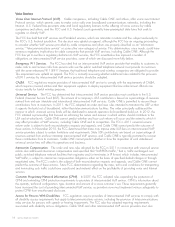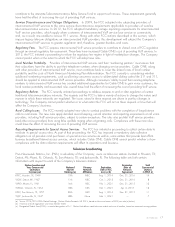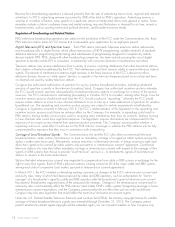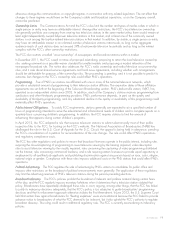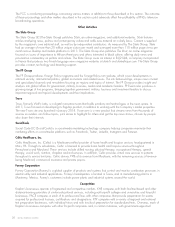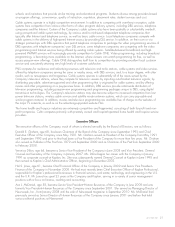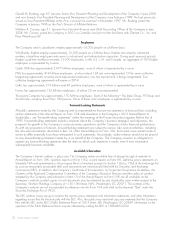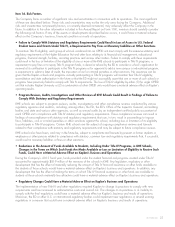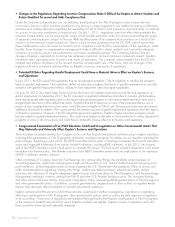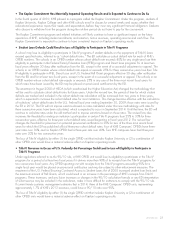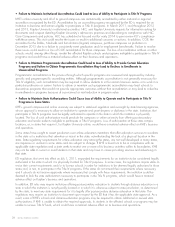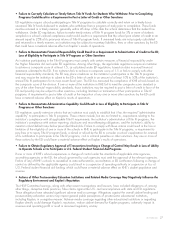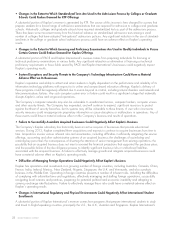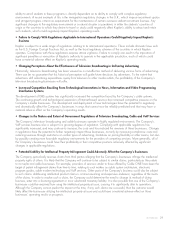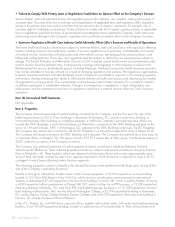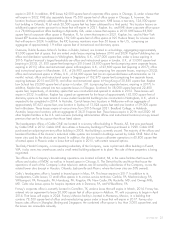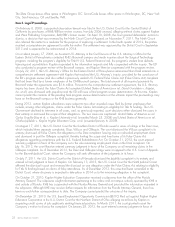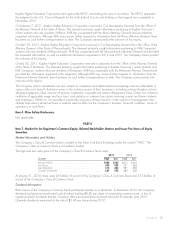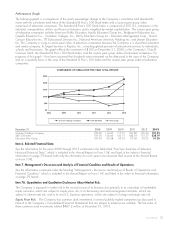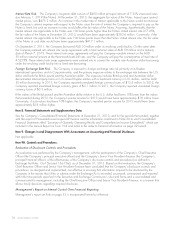Washington Post 2013 Annual Report Download - page 44
Download and view the complete annual report
Please find page 44 of the 2013 Washington Post annual report below. You can navigate through the pages in the report by either clicking on the pages listed below, or by using the keyword search tool below to find specific information within the annual report.• Failure to Maintain Institutional Accreditation Could Lead to Loss of Ability to Participate in Title IV Programs
KHE’s online university and all of its ground campuses are institutionally accredited by either national or regional
accreditors recognized by the ED. Accreditation by an accrediting agency recognized by the ED is required for an
institution to become and remain eligible to participate in Title IV programs. In March 2011, and throughout 2012
and 2013, Kaplan University’s institutional accreditor, HLC, sent Kaplan University requests for information asking for
documents and a report detailing Kaplan University’s admissions practices and describing its compliance with HLC
Core Components and policies. HLC has scheduled a focused visit for early 2014 to peer review KU’s compliance
with these areas. This visit could resolve the issues or result in additional concerns or actions. In addition, COE, the
accreditor for the Dallas, Nashville and San Antonio (Ingram) campuses, put those campuses on probation in
December 2013 due to a failure to consistently meet graduation and/or employment benchmarks. Failure to resolve
these issues could result in a loss of COE accreditation for those campuses. The loss of accreditation at these or other
schools would, among other things, render the affected Kaplan schools and programs ineligible to participate in Title IV
programs and would have a material adverse effect on their business and operations.
• Failure to Maintain Programmatic Accreditation Could Lead to Loss of Ability to Provide Certain Education
Programs and Failure to Obtain Programmatic Accreditation May Lead to Declines in Enrollments in
Unaccredited Programs
Programmatic accreditation is the process through which specific programs are reviewed and approved by industry-
specific and program-specific accrediting entities. Although programmatic accreditation is not generally necessary for
Title IV eligibility, such accreditation may be required to allow students to sit for certain licensure exams or to work in a
particular profession or career. Failure to obtain or maintain such programmatic accreditation may lead schools to
discontinue programs that would not provide appropriate outcomes without that accreditation or may lead to a decline
in enrollments in programs because of a perceived or real reduction in program value.
• Failure to Maintain State Authorizations Could Cause Loss of Ability to Operate and to Participate in Title IV
Programs in Some States
KHE’s ground campuses and online university are subject to state-level regulation and oversight by state licensing agencies,
whose approval is necessary to allow an institution to operate and grant degrees or diplomas in the state. Institutions that
participate in Title IV programs must be legally authorized to operate in the state in which the institution is physically
located. The loss of such authorization would preclude the campuses or online university from offering postsecondary
education and render students ineligible to participate in Title IV programs. Loss of authorization at those state campus
locations, or, in states that require it, for Kaplan University online, would have a material adverse effect on KHE’s business
and operations.
Some states have sought to assert jurisdiction over online education institutions that offer education services to residents
in the state or to institutions that advertise or recruit in the state, notwithstanding the lack of a physical location in the
state. State regulatory requirements for online education vary among the states, are not well developed in many states,
are imprecise or unclear in some states and are subject to change. If KHE is found not to be in compliance with an
applicable state regulation and a state seeks to restrict one or more of its business activities within its boundaries, KHE
may not be able to recruit or enroll students in that state and may have to cease providing services and advertising in
that state.
ED regulations that went into effect on July 1, 2011, expanded the requirements for an institution to be considered legally
authorized in the state in which it is physically located for Title IV purposes. In some cases, the regulations require states to
revise their current requirements and/or to license schools in order for institutions to be deemed legally authorized in those
states and, in turn, to participate in the Title IV programs. If the states do not amend their requirements where necessary
and if schools do not receive approvals where necessary that comply with these requirements, the institution could be
deemed to lack the state authorization necessary to participate in the Title IV programs, which would have a material
adverse effect on Kaplan’s business and operations.
In addition, ED rules may require institutions offering postsecondary education to students through distance education in a
state in which the institution is not physically located or in which it is otherwise subject to state jurisdiction, as determined
by the state, to meet any state requirements for it to legally offer postsecondary distance education in that state. The
regulations may require an institution to document upon request by the ED that it has the applicable state approval. As a
result, some of KHE’s schools and distance-education programs may be required to obtain additional or revised state
authorizations. If KHE is unable to obtain the required approvals, its students in the affected schools or programs may be
unable to receive Title IV funds, which could have a material adverse effect on its business and operations.
26 GRAHAM HOLDINGS COMPANY


